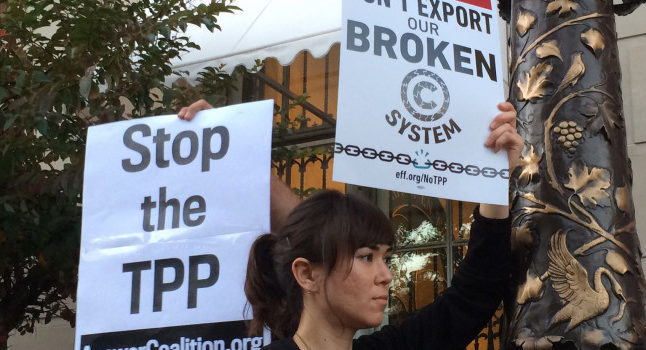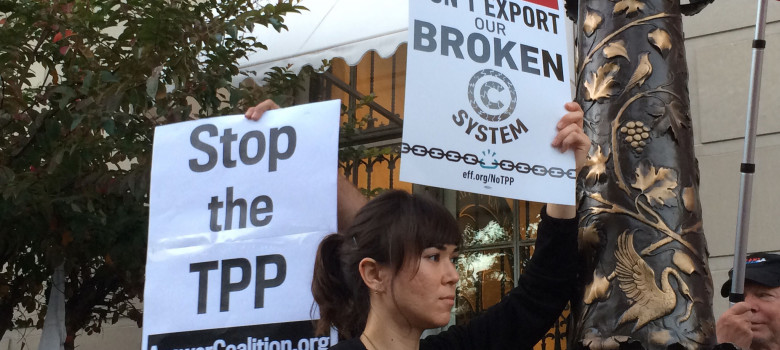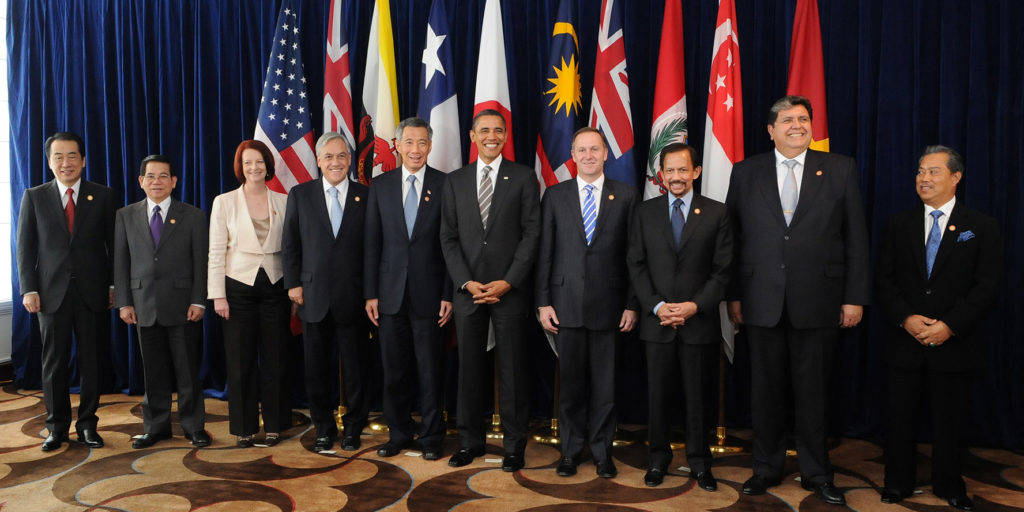Trans Pacific Partnership Under Fire From Both Right & Left in America
by David DeVoss
Foreign Ministers spend most of their time persuading other countries to do their bidding. But last month U.S. Secretary of State John Kerry flew to Los Angeles to convince a decidedly American audience to support the Trans Pacific Partnership, the newly controversial trade pact that would link the U.S., Mexico, Chile, Peru and Canada with Japan, Malaysia, Singapore, Vietnam, Brunei, Australia and New Zealand in a tariff-free zone accounting for nearly 40% of global trade.
The agreement “establishes strong, balanced rules to protect intellectual property and the 40 million Americans working in creative and digital industries — which I don’t have to tell you is a huge issue for California film studios and Silicon Valley,” Kerry proclaimed to the pro-business Pacific Council on International Policy. “In the 21st century you cannot only sell to yourself and expect to grow and survive, let along compete and thrive.”
There’s no question TPP will help certain U.S. industries. No longer will cotton exports face a 10% tariff in Vietnam. Japan will drop its 40% tariff on American frozen beef and 75% tariff on U.S.-made automobiles. Markets for almonds, walnuts, and pistachios should grow dramatically once 30% tariffs are eliminated in Southeast Asia.
TPP certainly is good for Asia. Japan is an enthusiastic proponent as is Vietnam, which stands to gain tariff-free access to North America for apparel, footwear and textiles. According to recent polls, 89% of Vietnamese support TPP, if only because they believe increased U.S. trade will counter China’s economic leverage. “TPP negotiations are done; Vietnam enters a new playground,” read a recent front page headline in Tuoi Tre, one of Vietnam’s largest selling newspapers.
The benefits of globalization may seem obvious to a corporate CEO and a price-conscious shopper seeking to buy cheap blue jeans or summer fruit in the middle of winter. But 2016 is an election year and the 5,544-page TPP agreement, negotiated in secret from 2010 to 2015, has landed with a thud. All five candidates for President – Democrats and Republicans alike – have denounced the proposed trade agreement. Democrat Bernie Sanders says the TPP will cost America’s middle class 448,000 jobs. Republicans Donald Trump and Ted Cruz are equally outspoken in their criticism, as is Hillary Clinton, who was a big fan when she was Secretary of State and the pact was first proposed.
Politicians’ beliefs “evolve,” of course, and there’s a chance the new President will embrace the agreement following the inauguration next January. But for the moment TPP in the U.S. is being denounced as “NAFTA on steroids.”
The 1994 North American Free Trade Agreement adopted during Pres. Bill Clinton’s first term was supposed to bring the U.S. all the benefits of a globalized economy. Thousands of manufacturing jobs would go to Mexico, the government admitted, but in return U.S. workers would receive training for many more higher wage, higher skilled positions. The Peterson Institute for International Economics in Washington, DC, named after Richard Nixon’s Secretary of Commerce, predicted NAFTA would create 200,000 American jobs. Instead it destroyed 845,000 manufacturing jobs that were replaced – if at all – by minimum wage positions in service industries.
NAFTA may have weakened the U.S. economy, but China’s entry into the WTO devastated U.S. manufacturing by eliminating the blue collar jobs that were vital to many parts of the country. Economist Gordon Hanson of the University of California, San Diego, estimates the U.S. has lost two million to 2.4 million jobs since 2000 because of more affordable imports from Beijing. Although U.S. manufacturing has recovered somewhat, polling suggest that America’s faith in globalization has been declining over the past seven years.
Americans are not the only ones unhappy with globalization. Economists Gary Hufbauer and Eujin Jung of the Peterson Institute cite more than 3,500 protectionist regulations – “microprotections” – which have been introduced quietly around the world since 2008.
China’s rise has confounded classical economic models that assume workers who lose employment in one industry eventually will find work in another. “China’s advance has toppled much of the empirical wisdom about the impact of trade on labor markets,” economists David Autor, David Dorn and Gordon Hanson noted in a paper published by the National Bureau of Economic Research. They believe China is responsible for the loss of 20% of America’s manufacturing jobs since 2000. Globalization they and many other economists conclude mainly produces a huge transfer of wealth from labor to corporate investors and the rich.
Barack Obama and John Kerry both insist that TPP will increase jobs while continuing to keep prices low. “TPP will be a clear win for American workers, American businesses and communities,” says Kerry. “These trade agreements are at the center of defending our strategic interests, deepening our diplomatic relationships, strengthening our national security and reinforcing our leadership across the globe.”
Washington’s ratification of TPP will underscore America’s strategic commitment to trading partners concerned about growing Chinese hegemony. But there is little evidence TPP will boost economies. According to the World Bank, the average tariff in developing and industrialized countries alike fell from 24% in 1990 to 8% in 2010. Tariffs can’t fall much more since most those remaining protect agriculture. In truth, 90% of U.S. exports to TPP countries already are duty free.
The Obama administration is attempting to burnish globalization’s tarnished reputation with a wave of publicity. Recently, it announced that TPP would eliminate 18,000 tariffs currently levied by the 11 other countries in the deal. But research by Public Citizen found that most of the tariffs, like Brunei’s tariff on ski boots, are inconsequential. Yes, American exporters no longer would have to worry about Malaysia’s shark fin tariffs, Vietnam’s whale meat tariffs and Japan’s ivory tariffs. But the U.S. does not trade in these products. Says Dean Baker, co-director of the Center for Economic and Policy Research: “So when the proponents of the TPP tout the 18,000 tariffs is this because they have no clue what they are talking about, or are they deliberately trying to deceive the public?”
U.S. Congressmen who wish to read the TPP agreements must do so alone in a locked room and are not permitted to take notes. Those who have done so say only two of the 26 chapters cover traditional trade matters. The bulk of the document, which must be accepted or rejected without any modification, consists of new rights and privileges for multinational corporations (especially international banks and pharmaceutical companies) and irrevocable constraints on government regulation. The document makes it easier for companies to move jobs offshore, take control of natural resources and prevent the regulation of financial services. Government contracts that give preference to Buy America or Buy Local procurement would be banned. TPP, which has no expiration date, only could be changed if all 12 nations agree. Conventional courts cannot adjudicate individual trade disputes in the countries where they occur. All disagreements must be decided by “Investor State Dispute Resolution” conducted by TPP Tribunals staffed by lawyers from the private sector who are empowered to force governments to pay unlimited fines to corporations that believe their profits are in jeopardy.
Plotted in secret, the TPP is a corporate coup d’état benefitting the drug, energy, banking and agribusiness industries. It was supposed to take effect this year but the process was delayed when Australia refused to submit to the corporate court system and New Zealand objected to pharmaceutical companies determining the price of drugs sold in New Zealand. All countries denounced America’s demand that regulations on financial speculation be eliminated and drug patent monopolies be extended so that the introduction of generic equivalents could be postponed for years.




